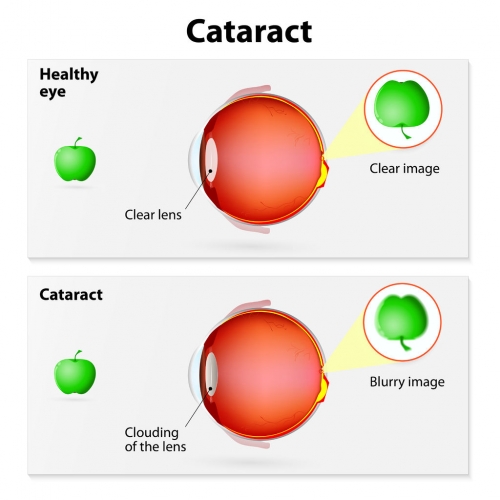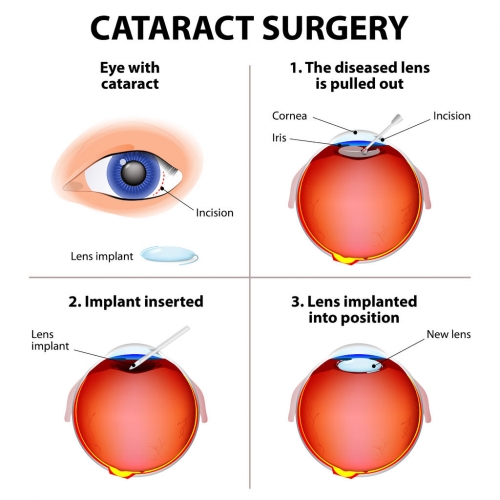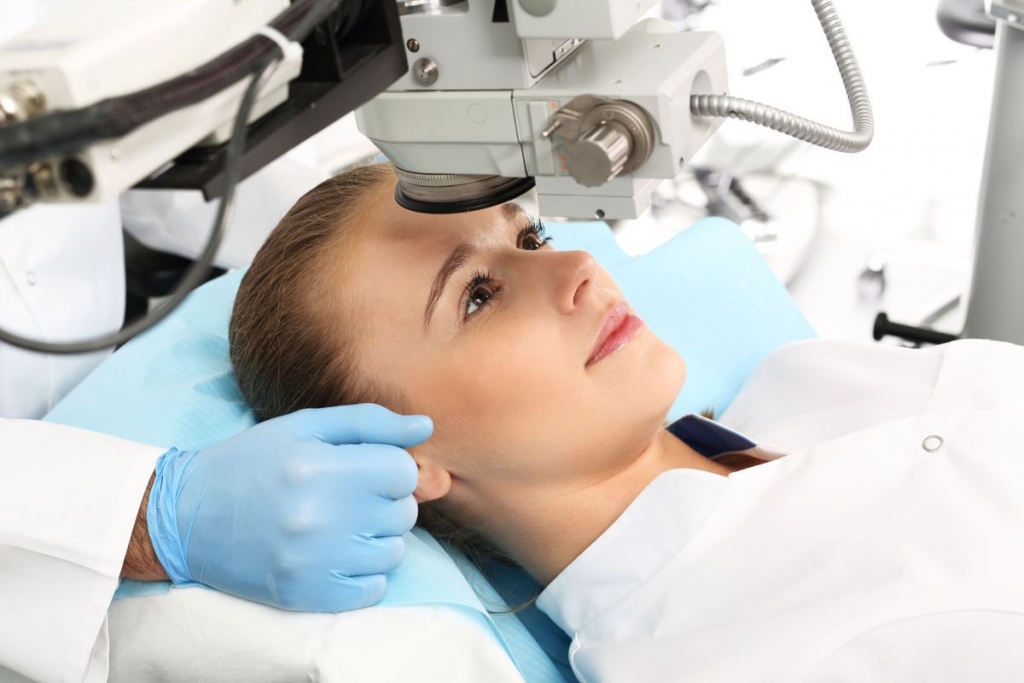Cataract surgery and artificial lens implantation
What is cataract?
Cataract is a common disease, with nearly 70 000 cataract surgeries performed in Hungary each year. Cataract is the greying of the lens of the eye. The greater the degree of blurred vision is, the greater the vision impairment. It can occur in one eye, but it can appear in both at the same time.
Since age is one of the biggest risk factors for the disease, it most commonly occurs over the age of 65. Rarely, it may occur at a younger age, especially in case of familial occurrence. In some cases, it can also be a congenital disease.
The older someone is, the better their chances of developing cataracts, but there are other risk factors such as:
- smoking
- diabetes
- diseases associated with a weakened immune system
What are the symptoms of cataract?

The “natural” part of aging is that if our vision becomes a little blurred over time, glasses are needed to read the newspaper, or our eye lens becomes a bit blurrier.
However, it is not at all natural if we can no longer read traffic signs with glasses, we cannot drive or work, hence our daily lives are affected by the deterioration of our vision. In such cases, it is recommended to visit an ophthalmologist as soon as possible so that the problem can be identified and treated in time.
The development of cataract is an irreversible process. The only treatment is surgery. However, there is no need to be scared, as long as the vision impairment is mild and the complaints are tolerable, there is time to consider the surgery’s timing. Cataract surgery is a low-risk, extremely safe, routine procedure that rarely involves complications.
Cataract surgery is recommended when:
- It makes work impossible (e.g. in case of driver, machine operator or other professions where vision is essential)
- You have lost 30% of your vision
- In any other case recommended by your ophthalmologist
How is the procedure done?
The eye is anaesthetized with eye drops before the operation, so you will not feel any pain during the surgery.
Anaesthesia or injection is used only under individual circumstances.
During cataract surgery, the ophthalmologist makes a very small (less than 3 mm) incision in the cornea. Through this, the ophthalmologist uses ultrasound to break up the lens into small pieces, which is then removed.
The artificial lens, which has been pre-selected by your doctor, is then implanted. The cutting wound closes automatically without stitches. No blood vessels are affected during the procedure, there is no bleeding.
At the end of the surgery, you will receive a dressing for your eyes, which you are advised to leave on for 24 hours.
After 1-2 hours of observation, you can leave Medicover Hospital, therefore if no complications occur during the procedure, there is no need for a hospital stay of several days. We recommend that you ask a family member or acquaintance to take you home, as it is not yet allowed to drive.

What are the advantages and disadvantages of cataract surgery?
If you have limited vision, surgery is your only option to see clearly again with minimal risk.
+ Cataract surgery is a short and routine procedure
+ Does not come with any pain during or after surgery
+ Significant improvement in vision is expected compared to the preoperative state
+ You may no longer need to wear glasses (depending on the type of artificial lens you choose)
– Over time (years later) posterior capsule opacity (PCO) can develop which can be eliminated with a 2-3 minute laser procedure
– In extremely rare cases, vision may be worse than before surgery
By following the pre- and post-surgery advice, you can greatly reduce the potential risks.
Am I fit for surgery?
In each case, your doctor will decide if the expected benefits of the surgery outweigh the potential risks.
However, there are certain situations where the intervention is more dangerous:
older people are more fragile and may experience complications more often
if you have more than one eye disease at a time, cataract surgery is not always recommended
Of course, following your doctor’s instructions after surgery can minimize any potential risks.
How do I prepare for surgery?
Certain tests are needed before cataract surgery. This gives your doctor the opportunity to weigh the risks and assess your general health. With a complete blood count and ECG, your ophthalmologist will make a decision as to whether the procedure can be performed safely for you.
You do not need to stop taking your medicines (e.g. blood thinners, insulin, heart medicines) with one exception: if you are taking a dietary supplement for prostate problems, do not take it for months before the operation as they may affect the success of the surgery.
You should also eat in the morning of the surgery, and we even recommend that you have breakfast and drink enough fluids.
What type of lens do I get and what happens to my vision after surgery?
The goal of cataract surgery is to restore vision to the state before the occurrence of cataract. This is achieved by removing the greyed, blurred lens and implanting an artificial lens.
However, it is also possible, as a secondary goal, to improve vision. If you have been forced to wear glasses – you are near of farsighted – it is also possible to implant a corrective artificial lens. This way, your vision can be completely recovered, no additional glasses are required.
Before the procedure, your doctor will examine your eyes and design the right artificial lens consulting with you.
What do I have to do after cataract surgery?
You will probably not be strained by the intervention. After just a few hours of observation, you can leave our hospital and continue to rest in your home. The use of antibiotic eye drops is recommended to prevent possible infections and pain.
It is not necessary to be at bed rest and avoid physical activity. You can continue your daily routine without any problems. You can also read, watch TV and drive. You only need to stay away from lifting heavy objects for two weeks.
Although minor inconveniences may occur, they are rare and mild. However, it is important to know that even though the greyed, defective lens will be removed and replaced by a suitable artificial lens, vision improvement will not be immediate. It takes the eye a few days to adapt to the changes and restore vision. Complete recovery can be declared after four weeks.

Is follow-up examination necessary after surgery?
It is important to have follow-up examinations regularly after cataract surgery so that your doctor can see that your eye is healing properly.
The first check-up takes place the day after the intervention, the second after 1 week, and the last one 4 weeks later. Then we usually prescribe glasses as well. If you do not live in the country or city where the surgery was performed, the last follow-up may be done at your place of residence. Follow-up examinations are not recommended to be missed as they are in your interest and will promote recovery.
What is included in the price of our surgeries?
- costs of the surgery
- costs of anesthesia (local or general anesthesia, postoperative pain relief)
- the costs of the planned hospital stay and care
- necessary medicines and certain medical aids during the stay
- inpatient physiotherapy treatment (if necessary for rehabilitation)
- if necessary, the fee for the planned histological examination
- the price of the first follow-up examination
What additional costs might be expected?
- implants
- consultation with the anesthesiologist (must be done in Medicover)
- pre-operative examinations (if performed by us)
- in case of blood group antibody positivity, the blood matching fee
- hotel service fee for extra care days
- aids for further rehabilitation
- accompanying person staying in the hospital
- day (with one meal) 20 000 HUF
- night (full board) 60 000 HUF
- furthermore, if necessary, the cost of the 2nd follow-up examination is the fee of the specialist examination -50%, the cost of the 3rd follow-up examination is the fee of the specialist examination -30%
The course of the surgery
Before surgery
- pre-surgery specialist consultation, where the specific surgical proposal is made
- consultation with the Case Manager
- general information if necessary
- preparation of a written quotation
- booking surgery and preliminary examination appointments
- payment
-
carrying out pre-operative examinations
-
arrival for surgery
On the day of surgery
- arrival at Medicover Hospital at 6:30
- check-in at the reception on the ground floor
- occupying a room accompanied by a nurse, who provides information
- morning visit with the specialist physician and anesthesiologist
- surgery
- postoperative monitoring
- afternoon visit with the specialist physician
- constant anesthesiology specialist monitoring in the postoperative period
- discharge (with an accompanying person), final report and handing over a certificate
Surgical service process
- surgery
- hospital stay and care
- planned histology
- follow-up examination, sutur removal
